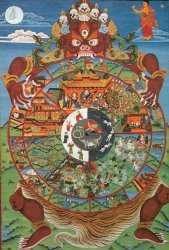DEPENDENT ORIGINATION

Dependent origination or conditioned arising (pañiccasamuppàda) is the Buddhist concept that (1) nothing is `a thing in itself' but is dependent for its existence on other things, and that (2) things come into being due to natural causation, not randomly or by the will of a supreme being. To give an example of the first of these concepts Ý we speak of `a flower' but if, one by one, we remove the stem, the petals, the nectar, the stamens, the pistils, etc, none of which are the flower itself, we find that the `flower' has gone. A flower is a convenient term for the sum total of its parts and each part is again the sum total of its parts too. This is true of cities, books, computers, rocks and people. Thus according to the Buddha, there is no permanent metaphysical self, soul or essence. Realizing this frees us from craving for life and terror of death and all the negative emotions and actions that go with them. Understanding the second of these concepts requires us to look within rather than without for the solution to the problem of individual and social conflict.
The Buddha gives at least three examples of dependent origination, one detailing the origins of the individual's experience of suffering, another explaining the origins of suffering within the social context and a third detailing the process leading to the transcendence of suffering and the attainment of freedom. The first is: ignorance conditions mental constructs, mental constructs condition consciousness, consciousness conditions name and form, name and form condition the senses, the senses condition contact, contact conditions feeling, feeling conditions craving, craving conditions clinging, clinging conditions becoming and becoming conditions rebirth, sickness, old age and death (D.II,55ff).
The second is: conflict is caused by the liked, the liked is caused by desire, desire is caused by pleasant and unpleasant, pleasant and unpleasant is caused by contact, contact is caused by name and form (Sn.862-871).
The third and most important schema of dependent origination is: suffering conditions faith, faith conditions gladness, gladness conditions joy, joy conditions tranquillity, tranquillity conditions happiness, happiness conditions concentration, concentration conditions disenchantment, disenchantment conditions dispassion, dispassion conditions freedom, freedom conditions knowledge of the destruction of the defilements (S.II,30). The Buddha said: `Dependent origination is not just profound but it looks profound too. It is through not understanding, not penetrating it that humanity is, like a tangled ball of string, a matted bird's nest, a grass thicket, unable to go beyond suffering, an unhappy destiny and saüsàra'(D.II,55).